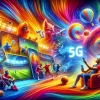
In the world of sports broadcasting, technological advancements have always played a pivotal role in shaping how we experience our favorite games. With the advent of 5G technology, a new era is dawning, promising unprecedented changes in the way sports are broadcasted and consumed. This article delves into the transformative impact of 5G on sports broadcasting, exploring its potential, real-world applications, and the challenges it presents.
The Promise of 5G in Sports Broadcasting
5G, the fifth generation of wireless technology, is more than just a faster internet connection. It offers lower latency, higher bandwidth, and increased connectivity, which are game-changers for sports broadcasting. Imagine watching a live game with seamless streaming, no buffering, and in ultra-high definition. That's the promise of 5G. By reducing latency to mere milliseconds, 5G ensures that live broadcasts are as close to real-time as possible, enhancing the viewer's experience. Higher bandwidth allows for multiple camera angles, augmented reality (AR) overlays, and instant replays, all accessible at the viewers' fingertips.
Real-World Applications: Case Studies and Examples
Several sports organizations have already begun to experiment with 5G technology. For instance, during the Super Bowl, 5G was used to provide fans with multi-angle replays and AR features that enhanced the viewing experience. Similarly, the NBA has tested 5G to deliver real-time stats and player trackers directly to viewers' devices. In soccer, 5G-enabled drones are being used to capture aerial shots that were previously impossible. These examples illustrate how 5G is not just a concept but a reality that's reshaping sports broadcasting.
Challenges and Considerations
While the potential of 5G is vast, there are hurdles to overcome. Infrastructure is a significant challenge. Implementing 5G requires substantial investment in new equipment and technology. Additionally, there are concerns about data privacy and security, as more data is transmitted over networks. Broadcasters must also consider the digital divide; not all viewers have access to 5G technology, which could create disparities in viewing experiences. Addressing these challenges is crucial for the seamless integration of 5G into sports broadcasting.
The Future of Interactive and Immersive Experiences
With 5G, the future of sports broadcasting lies in interactive and immersive experiences. Virtual reality (VR) and AR are set to become mainstream, allowing fans to experience games from the perspective of their favorite players or to have stats and information overlaid on the field during live matches. This level of interaction could transform passive viewers into active participants, creating a more engaging and personalized experience. The integration of AI with 5G can further personalize content, tailoring camera angles and commentary based on individual preferences.
Common Mistakes to Avoid in the Transition to 5G
1) Overestimating the immediate impact: While 5G offers many advantages, its rollout will be gradual. Broadcasters must set realistic expectations.
2) Neglecting infrastructure: Focusing solely on the technology without investing in the necessary infrastructure can lead to subpar experiences.
3) Ignoring security concerns: As data transmission increases, so do the risks. Ensuring robust security measures is essential.
4) Overlooking the user experience: While technical capabilities are important, the ultimate goal is to enhance the viewer's experience. Usability should not be compromised.
5) Failing to educate stakeholders: All parties involved, from production teams to viewers, need to understand the benefits and limitations of 5G.






























